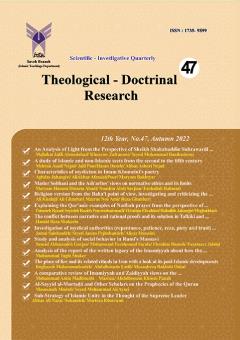An Analysis of Light from the Perspective of Sheikh Shahabuddin Suhrawardi and Imam Khomeini
Subject Areas : Islamic theologyMalahat jaliliahmadabad 1 , Khosrow Zafar Nawai 2 * , seyed mohamad banihashemi 3
1 -
2 - Department of Islamic Mysticism, Central Tehran Branch, Islamic Azad University, Tehran, Iran
3 - Assistant Professor, Department of Islamic Mysticism, Central Tehran Branch, Islamic Azad University, Tehran, Iran
Keywords:
Abstract :
Suhrawardi has relied on the Qur'an and Sunnah to prove his views in many of his works, mentioning a verse similar to the meaning of that verse and his opinion. Especially for the classification of light, he refers to the verse of light and according to the ranking that this verse gives to the holders of light, he classifies the light according to their degree of being single. And it is true light and calls all other lights the manifestation of divine and transcendental light. All levels of existence and degrees of knowledge are part of the evolution of light. In explaining the nature of light, he deals with the collective unity and the truth of Muhammad, the name of God Almighty, the perfect man and the province, and expresses the truth of light beautifully. In fact, the light of God is the most perfect and transcendent light, which Being light does not need another, but all other beings are illuminated by it. All beings, from the highest order, headed by the Prophet Muhammad (PBUH) and the saints, are enlightened by returning to the divine light, rather than the light of the servants who reach the luminous position through the dismemberment of the body and see the luminous. The expanse of divine light encompasses the entire universe, and through it all beings are placed in their own place. Suhrawardi in Hekmat al-Ishraq, which is his most important work on light, believes in the expanded existence of the true soul of Hazrat Haqq.
آشتیانی، سید جلال الدین (۱۳۷۸)، نقدی بر تهافت الفلاسفة غزالی، قم: بوستان کتاب.
آشتیانی، سید جلال الدین (۱۳۸۵)، در حکمت و معرفت، به کوشش حسن جمشیدی، تهران: پژوهشگاه فرهنگ و اندیشه اسلامی
اردبیلی، عبدالغني (۱۳۸۱)، تقریرات فلسفه (دروس فلسفه امام خمینی (ره)، تهران: مؤسسه تنظیم و نشر آثار امام خمینی (ره).
اشتراوس، لتو (۱۳۸۱)، فلسفه سیاسی چیست؟، تهران: شرکت انتشارات علمی و فرهنگی
التهانوی، محمدعلی (۱۹۶۷)، کشاف اصطلاحات الفنون، تهران: خیام و شرکاء
فنایی اشکوری، محمد (۱۳۸۹)، مقدمه ای بر فلسفه اسلامی معاصر، قم: مؤسسه آموزشی و پژوهشی امام خمینی
حائری یزدی، مهدی (۱۳۸۴)، جستارهای فلسفی (مجموعه مقالات)، به کوشش عبدالله نصری، تهران: مؤسسه پژوهشی حکمت و فلسفه ایران
حسن زاده آملی، حسن (۱۳۷۲)، هزار و یک کلمه، قم: بوستان کتاب.
حسن زاده آملی، حسن (۱۳۷۸)، ممد الهمم در شرح فصوص الحکم، تهران: وزارت فرهنگ و ارشاد اسلامی
خوارزمی، تاج الدین حسین بن حسن (۱۳۸۲)، شرح فصوص الحکم، تهران: انتشارات مولی
خمینی، سید روح الله [امام] (۱۳۷۴)، شرح دعاء السحر، تهران: مؤسسه تنظیم و نشر آثار امام خمینی(ره).
خمینی، سید روح الله [امام] (۱۳۷۵)، تفسیر سوره حمد، تهران: مؤسسه تنظیم و نشر آثار امام خمینی(ره).
خمینی، سید روح الله [امام] (۱۳۷۶)، شرح دعای سحر، ترجمه سیداحمد فهری، تهران: انتشارات فیض کاشانی.
مطهری، مرتضی (۱۳۷۱)، مجموعه آثار، مجلد۶ تهران: انتشارات صدرا.

